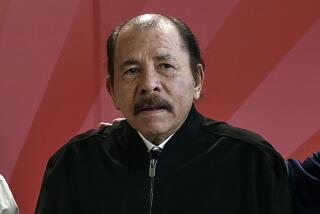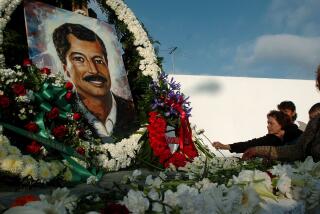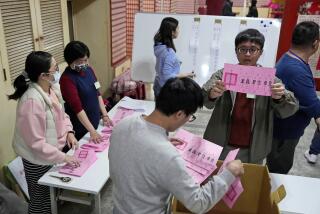Voter fraud allegations directed at Nicaragua’s Sandinistas
One of the main gains of the Sandinista revolution in Nicaragua nearly 30 years ago was a system of free and fair elections that allowed voters to give President Daniel Ortega the boot in 1990 and then return him to power in 2006. Unfortunately, this hard-fought achievement is at risk now, on Ortega’s watch. The opposition has declared fraud in this month’s municipal elections and its protests have been put down by Sandinista mobs, clashes that threaten to spiral if the government does not take extraordinary steps to resolve questions about the results.
Ortega’s Sandinista party claimed victory in the vast majority of the 146 municipal races, and although several are contested, the central battleground is in the capital of Managua, where the Sandinistas’ candidate, former world boxing champ Alexis Arguello, was declared the winner. The Supreme Electoral Council, which is controlled by the Sandinistas and their allies, announced that Arguello won 51% of the vote for mayor of Managua and opposition Constitutionalist Liberal Party candidate Eduardo Montealegre won 46%. Montealegre is a former finance minister who lost the presidential election to Ortega in 2006.
Problems with the mayoral election began well before the vote, however, when some parties were prohibited from putting up candidates, and the government raised suspicions by deciding not to accredit independent national observers and most international monitors. Observers from the European Union, the Washington-based Organization of American States and the Atlanta-based Carter Center were not invited, although those very groups successfully oversaw the election that brought Ortega back to power two years ago. After the Nov. 9 vote, the opposition asserted that marked ballots were dumped and destroyed, that party members were refused access to some of the vote counts and that tallies from many polling places were altered.
Nicaragua must restore confidence in its electoral process. The U.S. State Department has expressed concern about the election, and Venezuelan President Hugo Chavez has joined Ortega in accusing the United States of trying to intervene in Nicaragua’s internal affairs. This election must not be part of the U.S.-Venezuelan tug of war. Rather, Ortega must work with the opposition to come up with a mutually agreed-upon list of independent observers to oversee a recount of the contested results. We think that should include the same groups that ensured respect for Ortega’s 2006 victory, but it also might include representatives from left-of-center governments in countries such as Brazil, Ecuador and, yes, even Venezuela, to avoid allegations of a pro-U.S. taint. The more eyes the better on Nicaragua’s ongoing pursuit of democracy.
More to Read
A cure for the common opinion
Get thought-provoking perspectives with our weekly newsletter.
You may occasionally receive promotional content from the Los Angeles Times.






